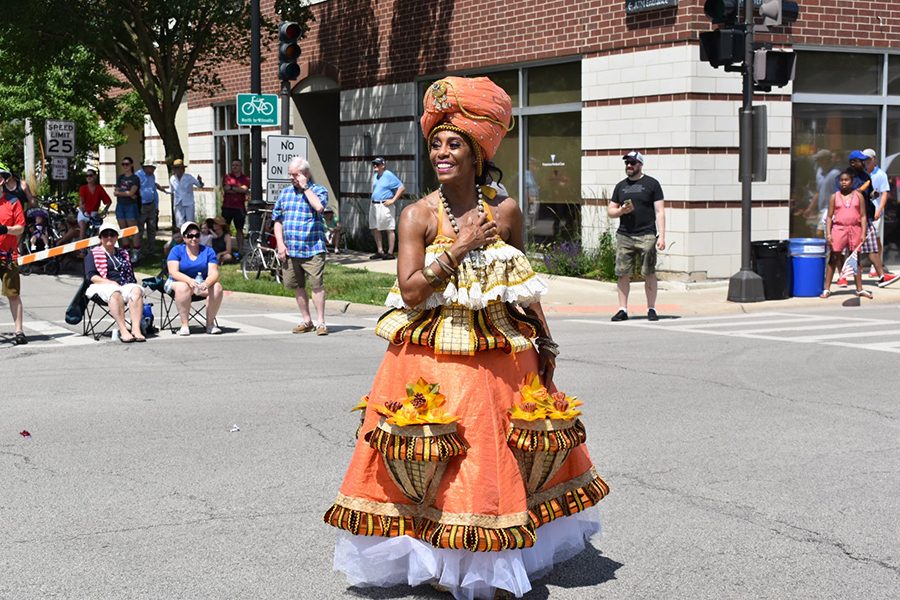Evanston Escola de Samba brings Brazilian flair to Fourth of July parade
Isabella Werneck/The Daily Northwestern
Dill Costa in the 2019 Fourth of July Parade. In addition to dancing, Costa also has experience as an actress and percussionist.
July 5, 2019
Percussion-based music echoed in the streets as dancers and musicians from the Evanston Escola de Samba invited people to clap along with the beat. Dancers wearing bright pink, blue and orange costumes and heavy skirts greeted people along the way.
The Evanston Escola de Samba, an organization that teaches and performs Brazilian music and dance, came together for the 10th time during the Fourth of July Parade to celebrate multiculturalism and American independence.
The group was founded in 2003 by Dill Costa, a Brazilian actress, percussionist and dance teacher, and Chris Hasselbring, an American musician with a passion for Brazilian music. The idea for the “School of Samba” was born when Hasselbring visited Rio de Janeiro with Costa during Carnival, a nationwide festival that showcases samba performances.
Costa said after she took Hasselbring to a samba performance in Brazil, “he went crazy.”
“We created the Evanston Escola de Samba because it was both my dream and his,” Costa said in Brazilian Portuguese.
Costa led the samba dancers through the streets in the rhythm of samba music, smiling and waving to the crowds. She introduced the group in her native language, Brazilian Portuguese.
For Ailton Nunes, a Brazilian percussionist who was once the “percussion master” of the famous samba school Mangueira, the Evanston Escola de Samba presents an opportunity to share Brazilian culture with American samba admirers. He is now leading the organization’s musicians together with Reed Flygt, the president of the group. Together, they trained the musicians to perform, rehearsing only four times — while also training musicians who had never played samba before.
Nunes said this development was made possible not only by the leading professionals but also by the level of engagement of each musician.
Each performer had a different perspective on the meaning of samba. For example, caixa player Eric Platt said samba means excitement. For Matthew Rarey, samba means years of Brazilian history.
“When I hit that drum, there are hundreds of years of history that come with every hit. It’s what excites me,” said Rarey, who is also a professor of African, European and Brazilian art history at Oberlin College.
However, many said samba means community. The musicians said within both the school of samba and the parade environment around them, they felt a strong sense of family.
“It’s always been a bit of a home to me,” Flygt said of the samba organization.
Nunes said it is fascinating to see Americans show interest in Brazilian music, which makes him incredibly happy.
According to Rarey, the presence of Brazilian culture means representing what makes the United States the country it is.
“It’s really necessary that (on) the Fourth of July we can celebrate the multiple lines of cultural influence to this country,” Rarey said.
Email: bellaowerneck@gmail.com



